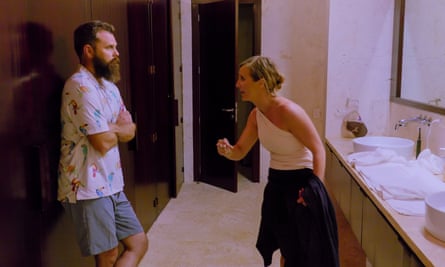Review of The Trust: A Game of Greed – reminiscent of a low-cost imitation of The Traitors.
The Trust: A Game of Greed is a Frankenstein’s monster of new reality TV. It borrows parts from its contemporaries and glues them together in the latest iteration of the “social experiment”.
In this situation, a group of 10 individuals of varying ages and occupations are presented with a cash prize of $250,000 (£196,000). The presenter, Brooke Baldwin, a previous host of CNN, explains that everyone starts as a winner and has the opportunity to leave as one, as long as they are willing to share. To do this, they must trust each other to divide the money fairly, even when faced with challenges such as ranking each other’s intelligence or voting on who has been the most sexually active.
The subtitle of The Trust clearly reveals its true nature. It is contradictory to label oneself as a game of greed while also expecting the audience to question whether the players will strive for a perfect society. This is not a show where individuals cooperate and distribute resources based on need. Instead, it is based on the Hobbesian belief in the selfishness of human nature; the show’s premise relies on contestants betraying each other for the chance at a large sum of money. Honesty and following a plan are not viable options, as one contestant bleakly states, “the world doesn’t operate like that.”
The prize money and the sacrifices required to obtain it are reminiscent of the popular show Squid Game: The Challenge. The show’s concept combines elements from Love Is Blind, Love Island, and Survivor, including a “trust ceremony” where contestants must decide whether to vote someone out of the house or not, potentially increasing their share of the prize. Similar to the show Big Brother, the contestants live together during the competition, leading to quick bonds and declarations of eternal love and family, even after only spending 24 hours together.
Of course, its closest relative is The Traitors. The Trust is like a bootleg handbag version of the hit show, where the font is the same, but the brand name is “Traytors” and the zip comes off when you touch it. They sit around a table, arguing about whether they will vote and who deserves to go. Then they head to the top of a cliff and, when they are alone, do everything they said they wouldn’t do.

Similar to The Traitors, The Trust highlights how individuals struggle to accurately perceive others. People make assumptions about who they can trust, often getting caught up in the fabricated drama of reality TV. However, upon further reflection, it becomes clear that these assumptions are not always accurate. One contestant solemnly states, “We can’t all make it to the end.” But in reality, according to the rules of the game stated at the beginning, everyone has the potential to succeed.
Similar to The Traitors, this is a representation of reality television during its normcore phase, where appearance is not limited to models and producers have recognized the importance of featuring individuals over the age of 35 with strong opinions on screen. However, since this is a production from the United States, it is more exaggerated and less subtle. One participant confidently claims to be “1,000% honest”, enthusiastically increasing the percentage to make a bold statement.
However, it prioritizes drama over humor and kindness. The casting was done with the intention of creating conflict. Rather than targeting one player as the villain, there seems to be a general tendency towards portraying them as such. It’s difficult to root for any particular person as they are all driven by their own greed.
This is a cunning contest, where participants often betray each other. It excels at creating shocking moments of disloyalty and misconduct. Baldwin’s inclusion suggests that there should be more news journalists involved in reality TV. She poses intelligent and direct inquiries, treating the competition with a level of seriousness that may be unnecessary. It makes me wonder if Emily Maitlis should consider competing on Casa Amor in the future.
Skip the promotional newsletter.
after newsletter promotion
However, The Trust has a certain unpleasant quality that The Traitors lacks. The contestants have disturbing pasts that seem too extreme for this type of setting. Learning about their true suffering brings a bitter element to the theme of “life’s not fair” in what is essentially a trivial television contest.
However, it remains captivating, albeit in a gruesome manner. The Traitors airs only three nights a week.
Source: theguardian.com


